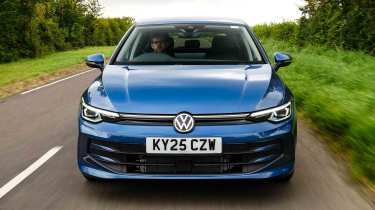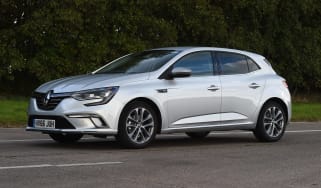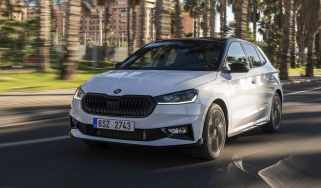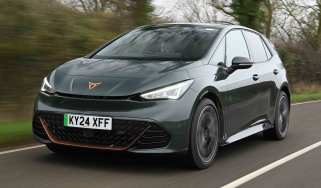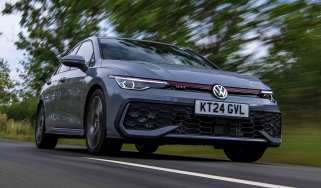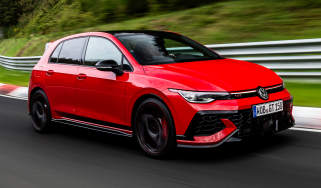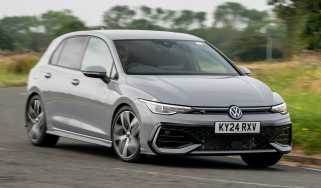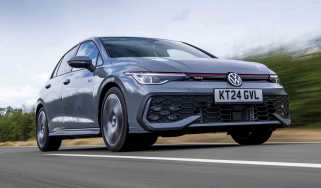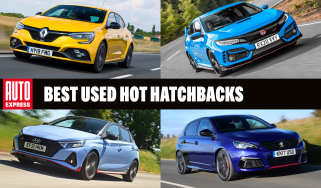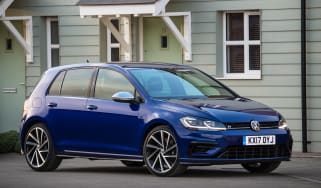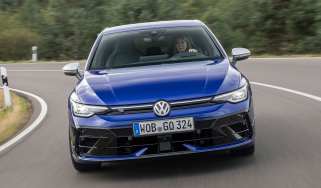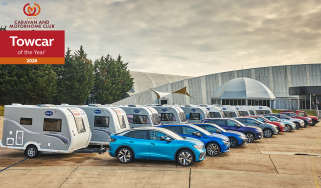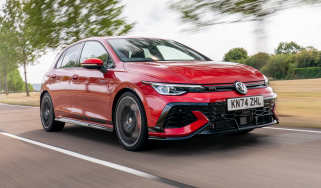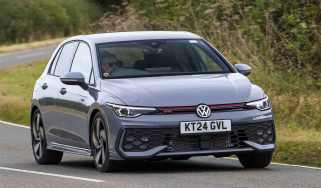Volkswagen Golf review
The latest VW Golf has cleaner engines, an updated interior and improved on-board tech, but it still misses top honours

Our opinion on the Volkswagen Golf
The eighth-generation Volkswagen Golf scored well when it was first launched in 2020, but shortcomings meant it wasn’t as convincing as its previous incarnations. VW’s family car icon had long reigned supreme, combining classy looks and practicality while also being good to drive, but some poor decisions made about the latest car’s ergonomics meant it wasn’t as user-friendly as the VW Golf Mk7. However, the facelifted VW Golf Mk8.5 addresses most of these quibbles, and the car remains a comfortable and pleasant place to be, for the most part. The ride quality is still rather compromised, though, particularly over poorer surfaces, and there’s intrusive road noise at speed, especially on larger diameter wheels.
When you buy a Volkswagen Golf, you expect quality, but the current model doesn’t feel head-and-shoulders above its rivals, even in its updated guise. The focus on technology that was far from perfect at launch hampered things, but this is where the Golf Mk8.5 has made significant progress, with more intuitive touchscreen controls and improved ergonomics. However, compared with the competition, the VW Golf still isn’t the class benchmark it once was.
About the Volkswagen Golf
The Golf name is second only to the Beetle in the history of Volkswagen in terms of importance, having been in production for over five decades and with more than 37 million examples sold worldwide. It’s the brand’s iconic family car - although the likes of the Volkswagen Tiguan SUV are challenging that position.
Used - available now
Such a popular model has been spun off into not one but three performance variants (one plug-in hybrid called GTE, one regular hot-hatch called the GTI, and a fire-breathing four-wheel drive version called R). The regular line-up consists of five trim levels and five different engines that include two petrol, two diesels, and a company car friendly plug-in hybrid.
Volkswagen Golf prices and latest deals
The Golf has always been marketed as a cut above the competition with premium pricing to match, and it’s still the case that the Golf carries a premium, although we can help you to spec your ideal Volkswagen Golf with our buy a car service and find the best deal from dealers around the UK. You can also find a great lease deal on a Golf, search for a used Volkswagen Golf and even help you sell your old car.
Five trim levels are available:
Life (from just over £28,000)
Match (from just under £28,500)
Style (from around £31,000)
R-Line (from £31,500)
Black Edition (from £32,500)
There’s also the hot plug-in hybrid GTE for around £40,000. The perennial GTI starts from £41,000, while the GTI Clubsport is around £43,500. The quickest R and R Black Edition models start from £46,000 and £47,000, respectively.
Engines, performance & drive
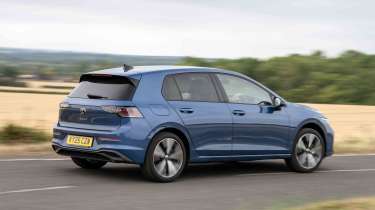
Pros |
|
Cons |
|
You’re spoilt for choice when it comes to engines in the Golf, which includes some diesel engines for high-mileage users, some petrol engines, and a few plug-in hybrid options for company car drivers. It’s a shame that the Golf is still without an all-electric choice like the Peugeot 308 and Vauxhall Astra, although VW would argue the Volkswagen ID.3 covers that market.
A six-speed manual is standard with the 1.5 petrol and the least powerful diesel, while a seven-speed dual-clutch automatic is an option for the 148bhp 1.5-litre petrol and standard on the 148bhp 2.0-litre diesel, GTI, and R models. A six-speed dual-clutch automatic is exclusive to plug-in eHybrid and GTE models.
There are also a couple of Golfs for keen drivers, starting with the evergreen Volkswagen Golf GTI and potentially the licence-loosing Volkswagen Golf R, which you can read about in our respective individual reviews.
Performance, 0-60mph acceleration and top speed
The engine line-up for the front-wheel-drive Golf includes TSI petrol and TDI diesel engines. The entry-level 1.5-litre that replaces the older 1.0-litre three-cylinder petrol offers 114bhp and manages a 0-62mph time of 9.9 seconds. It’s fine for town work, but it needs some stoking to get up to motorway speeds.
That’s why we prefer the more powerful 148bhp 1.5 TSI, which is a much more flexible engine with a quicker 0-62mph time of 8.5 seconds. We’re yet to try the revised Golf with either of its 2.0 TDI engine options, but Volkswagen quotes 0-62mph times for the 113bhp and 148bhp diesels, as 10.2s and 8.0s, respectively. Past experience with the 148bhp version suggests it’s a refined and smooth engine once on the move, with plenty of punch for motorway cruising and overtaking slower-moving lorries. The 201bhp eHybrid is also a swift performer, with a 0-62mph sprint of 7.4 seconds.
Performance from the GTE plug-in hybrid is pretty rapid, with the 0-62mph dash taking just 6.6s, while the GTI model is even quicker at 5.9s. At the top end of the range, the Volkswagen GTI Clubsport races to the same benchmark in 5.6s, while the hot R is a second quicker with a time of 4.6 seconds.
| Model | Power | 0-62mph | Top speed |
| 1.5 eTSI 150 Life DSG | 148bhp | 8.4 seconds | 139mph |
| 2.0 TDI 115 Match | 114bhp | 10.2 seconds | 126mph |
| 1.5 GTE | 268bhp | 6.6 seconds | 143mph |
Town driving, visibility and parking
Undoubtedly, the most important quality of a family hatchback is its ease of use, and more than ever, the Golf is a car anyone can hop into and just immediately feel comfortable with.
The mild-hybrid technology on the 1.5 e-TSI smooths out some of the rough patches that we’ve previously noticed with VW’s DSG gearbox – particularly when moving off or reversing into a tight parking space. In comparison, the TDI diesel auto without the MHEV system still suffers from a touch of jerkiness, but the generous low-down torque means that the gearbox doesn’t need to kick down quite as often.
The Golf’s steering is nicely weighted and fairly precise, but it doesn’t offer much feedback and is quite slow off-centre, which in some situations means that the Golf doesn’t feel like the most agile hatchback on the market.
B-road driving and handling
One of the VW Golf’s strengths has been to offer a chassis that delivers competent (if not class-leading) body control through corners without compromising ride comfort on a bumpy road.
Those characteristics continue with the updated Mk8.5; it’s not the firmest model in its class, but there’s sufficient control for big bumps to be dealt with in a single bounce of the springs.
While some rivals handle more sharply, the Golf’s set-up is very well judged for Britain’s bumpy roads. The balance is impressively neutral, and grip, especially on the front axle, is strong.
Motorway driving and long-distance comfort
The Golf isn’t the most refined car in its segment at speed – the Peugeot 308 has it narrowly beaten here, thanks to a touch less road noise – but the VW’s high-speed stability is class-leading. A strong engine line-up also works in its favour at higher speeds. Across the board, the power delivery is smooth and the engines are refined – even the diesels are muted under load.
“I think the six-speed manual is fine, but not as slick as what you’ll find in a Mazda 3. Also, the clutch pedal in the Golf lacks a bit of feel for the biting point, requiring a little acclimatisation before you get the knack for making smooth gear changes.” – Max Adams, online reviews editor
MPG, emissions & running costs
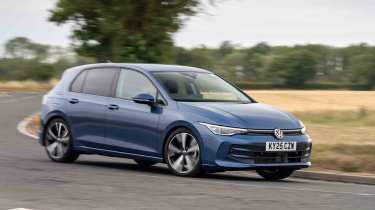
Pros |
|
Cons |
|
Officially, the 114bhp 1.5 TSI petrol achieves 53.3mpg, while the diesels are better still, with an official 64.2mpg figure for the 114bhp 2.0 TDI. Our preferred 148bhp 1.5 TSI isn’t far behind its less potent sibling at 53.2mpg (so there’s little reason not to go for the more flexible version), while the automatic-only 148bhp 2.0 TDI isn’t quite as good as the less powerful version, but 61.4mpg isn’t that far behind.
Volkswagen has introduced many features to improve the Golf’s green credentials. Plug-in and mild-hybrid versions, stop-start systems, and cylinder deactivation feature in the model line-up. The mild hybrid 148bhp 1.5 eTSI does use less than its non-hybrid equivalent, but 54.3mpg isn’t enough reason to go for it unless you have to have a petrol automatic car.
Volkswagen claims the GTE will average 706.2mpg, although our past experience with plug-in hybrid cars suggests you’re unlikely to get near that figure, even when you regularly charge the battery. The less costly eHybrid also has a very high fuel economy figure of 941.6mpg, which again, you’re unlikely to see in real-world driving.
The thirstiest models in the range are the GTI and R models, at 39.4mpg and 34mpg, respectively.
| Model | MPG | CO2 | Insurance group |
| 1.5 eTSI 150 Life DSG | 54.3mpg | 119g/km | 20E |
| 2.0 TDI 115 Match | 64.2mpg | 117g/km | 19E |
| 2.0 TSI R | 34.9mpg | 184g/km | 33E |
Electric range, battery life and charge time
Company car users will be particularly taken with the revised Golf GTE thanks to its ability to cover around 81 miles on electric drive alone, or the eHybrid Style with up to 89 miles of electric-only range.
Both plug-in hybrids can be put on a rapid charger, although it’s best not to clog up a 350kW ultra rapid charger because the peak speed the Golf can accept is 40kW. Charging that way from 20 to 80 per cent can be as quick as 26 minutes, but we say it’ll be much more cost-effective to use a 7.4kW wallbox charger on a cheaper overnight tariff, which should take around four hours to fully recharge its 25.7kWh (19.7kWh usable) battery.
The battery pack in the Golf is covered by a separate warranty, and is expected to maintain above 70 per cent of its capacity for up to eight years or 100,000 miles, whichever comes first.
| Model | Battery size | Range | Insurance group |
| 1.5 eHybrid Match | 19.7kWh (usable) | 89.5 miles | 26E |
| 1.5 GTE | 19.7kWh (usable) | 81.4 miles | 30E |
Insurance groups
The entry-level Golf Match 1.5 TSI starts from group 17 insurance, while performance versions climb much higher; the GTI is rated at group 31, and the R is group 33.
Tax
There’s no fully electric version of the Golf yet, with an ultra-low benefit-in-kind (BiK) tax rate like its Peugeot E-308 or Vauxhall Astra Electric rivals, although there is the Volkswagen ID.3, which is an EV that’s a similar size to the Golf. The lowest CO2 versions of the Golf are the eHybrid with emissions of 6g/km, followed by the GTE at 7g/km.
Next up is the 117g/km 114bhp 2.0 TDI, then the 119g/km 1.5 eTSI, and 120g/km 148bhp 2.0 TDI and 114bhp 1.5 TSI. Our favourite 148bhp 1.5 TSI comes in at 123g/km. As you’d expect, the high-performance GTI and R models produce the most emissions, at 161g/km and 183g/km, respectively.
The latter two models mentioned attract the luxury car tax surcharge for cars costing over £40,000, whereas the GTE narrowly escapes this after you’ve taken off the first year vehicle excise duty (VED) and registration fee. However, you still need to be careful with adding options to higher trim levels because it’s entirely possible to spec a Golf beyond this limit.
Depreciation
According to our expert depreciation data, the petrol options hold their value best, with the numerous variants of the 1.5 TSI clinging on to roughly 48 per cent of their original price after three years or 36,000 miles. In contrast, the most expensive R model loses the most value, at around 40 per cent retained value over the same period.
In comparison, the Vauxhall Astra is only likely to maintain between 30 to 40 per cent of its value, while the slightly more costly Toyota Corolla is expected to maintain between 47 to 50 per cent.
To get an accurate valuation for a specific model, check out our free car valuation tool...
Interior, design & technology
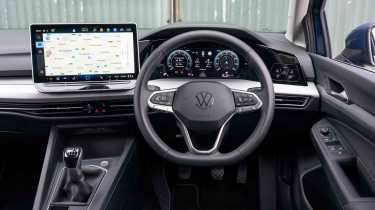
Pros |
|
Cons |
|
The overall profile of the car is still unmistakably a Volkswagen Golf, but the latest facelifted version features many subtle detail changes that give it more visual impact than the previous Mk7 model.
Entry-level Life trim offers a generous amount of kit and tech, including wireless smartphone charging, front and rear parking sensors, plus adaptive cruise control. However, we think Match trim makes the most sense, because not only does it unlock our preferred 148bhp 1.5 TSI engine (along with other engines including the plug-in eHybrid, a diesel, and the eTSI mild-hybrid), it also has:
- 17-inch alloy wheels
- A reversing camera
- Keyless entry and start
- Rear privacy glass
- Automatic high beam assistance
The Style model is the more luxurious one with upgraded upholstery and more figure-hugging sports seats, while R-Line has a sportier look. The pricier Black Edition enhances the more aggressive looks of R-Line with some black exterior trim details, adaptive LED headlights and an illuminated ‘VW’ badge. It’s also the only model in the Golf range to get standard heated front seats without you having to pay a subscription for them.
Interior and dashboard design
It was the cabin that came under fire most strongly when the Mk8 arrived, and it’s here where the biggest improvements have been made for the Mk8.5. The fiddly touch-sensitive steering wheel controls some versions previously had have thankfully been ditched and have reverted to physical buttons. These are far more intuitive to use on the move.
Not all have returned, however. The main volume control is still an awkward slider below the touchscreen, although it’s less of a negative than it was previously because at least it’s backlit now so it can be used in the dark. It’s a little more responsive than before, and the driver has access to proper volume-control buttons on the steering wheel.
Materials and build quality
Initially, the Golf Mk8’s cabin was a let down compared with its Mk7 predecessor because the materials used didn’t feel quite as posh as we’ve come to expect from the famous nameplate.
Sadly, not too much has changed on that front with the Mk8.5, so while it all feels fairly well put together, rivals such as the Peugeot 308 and even the Skoda Octavia feel more expensive inside.
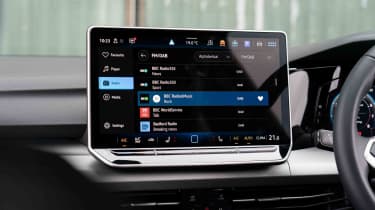
Infotainment, sat-nav and stereo
All Mk8.5 Golfs have a 13-inch Discover touchscreen system, and while it doesn’t quite sit as neatly on the dash as the digital instrument cluster, it’s a welcome improvement compared with the system it replaces.
The latest screen has faster loading times, an easier to navigate menu layout, and its additional size means that the climate controls are now on permanent display at the bottom of the screen. While we’d rather have physical controls to make quick adjustments to the temperature, the revised set-up is much better than before.
Many of the Golf’s driver-assistance systems have been tweaked. These include the Park Assist function, which can now detect if a space is large enough for the car as it drives beside it. If it is, the VW can drive itself into the bay by adjusting the drive and steering. A 360-degree camera system is available as a £600 option on entry-level Life trim if you’d rather do it yourself but need a better view of your surroundings.
“I prefer to turn off the audible speed limit warning and lane keep assistance via the IQ Drive menu of the digital instrument cluster. You get to it by pushing the ‘Ok’ button that’s on the steering wheel, and it pulls up a little menu on the screen rather than having to distract yourself with the central touchscreen.” - Max Adams, online reviews editor
Boot space, comfort & practicality
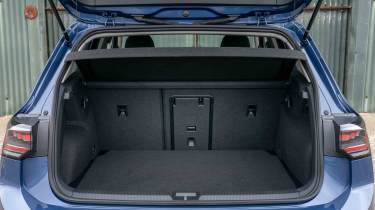
Pros |
|
Cons |
|
Previous generations of Volkswagen Golf have been available in both three- and five-door forms, but the latest Golf has gone down the more practical route of offering just a five-door body style only. Unfortunately, the Volkswagen Golf Estate has been dropped, so you’ll need to look at the bigger Volkswagen Passat for a VW with the ability to swallow an antique chest of drawers, or head over to Skoda where both the Octavia and Skoda Superb can be had in load-lugging forms. The pseudo-SUV Volkswagen Golf Alltrack with four-wheel drive has also been dropped.
Dimensions and size
The Mk8 Golf grew a few centimetres over the Mk7, and the update hasn’t changed this. The five-door hatchback is 4,284mm long, 1,789mm wide (excluding door mirrors), and 1,491mm in height.
| Dimensions | |
| Length | 4,282mm |
| Width | 1,789mm |
| Height | 1,483mm |
| Number of seats | 5 seats |
| Boot space | 381-1,237 litres (273 litres eHybrid and GTE) |
Driving position, seats & space in the front
The driving position is spot on, while a wide amount of adjustment in both the front seat and the steering wheel makes it easy for most people to get comfortable behind the wheel. Electric front seat adjustment with memory settings can be had for £825, which might be useful if you share the car with another driver and want to quickly recall your seating position. The ability to raise the seat up high if necessary and the small windows in the windscreen pillars mean better visibility than in most rivals.
There are some well thought out storage areas, from the large glovebox to a dedicated smartphone slot complete with wireless charging. The latter is angled forward so your device can’t fall out of place while driving. The door bins are large and are carpeted both front and rear to stop items from rattling about. That does mean they’re not a great place to store snacks, though.
Seats & space in the back
Adults will find a reasonable amount of kneeroom compared with most rivals, while the flat roofline means that even taller people have space above their heads. The outer seats are quite sculpted, and are a little more upright than in other rivals.
If you need to squeeze three people in the back, the middle seat occupant will find the central position is fairly soft, and there’s a high central tunnel they’ll need to straddle, forcing their feet into the space of the other two occupants.
Storage is decent, with map pockets and smaller smartphone slots on the back of the front seats. If only two people are sitting in the rear, there’s a fold-down central armrest with a pair of cup-holders.
A pair of Isofix child seat mounting points are provided on the outer positions of the rear bench seat, plus the front passenger seat. The hooks in the back are hidden behind some easily removable plastic tabs.
Boot space
A 381-litre boot capacity isn’t the largest available in the segment, but it is a neatly designed shape with a fairly low loading lip. An adjustable height boot floor is also available, helping to create a level load area in its highest position when the rear seat backs are folded down. When in this configuration, the hatchback’s overall storage capacity increases to 1,237 litres.
Just be aware that the R model has a smaller 341-litre boot due to modifications required in order to accommodate the four-wheel drive system. The battery pack in the plug-in eHybrid and GTE models takes up even more space under the boot floor, reducing capacity to 273 litres.
Towing
If you're planning on using your Golf for towing duties, then you'll be best served with the 148bhp 2.0-litre diesel that can tow a braked trailer or caravan of up to 1,600kg, or either the eHybrid and GTE plug-in hybrid models that can pull up to 1,700kg.
The 148bhp 1.5 TSI petrol and 114bhp 2.0 TDI diesel can haul around 1,500kg, while the 114bhp 1.5 TSI has 1,300kg of towing ability – although we suspect it’ll feel a bit underpowered up hills. Surprisingly, the Golf GTI and Golf R are both rated to tow, with max weights of 1,600kg and 1,700kg, respectively.
“I like that they’ve retained the handy clips that hold the boot floor in place, which is especially useful if you’ve specified the spare wheel option and need access to it when changing a wheel.” - Max Adams, online reviews editor
Reliability & safety
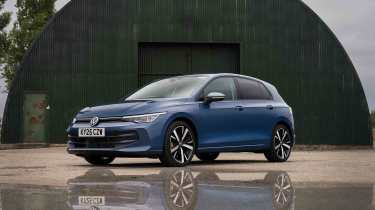
Pros |
|
Cons |
|
Unfortunately, the latest Volkswagen Golf came second from last in the 2025 Driver Power satisfaction survey, only one place up from its 2024 score. Owners are unhappy with numerous aspects of their cars, with the majority of issues surrounding the infotainment system, and the mix of touchscreen and physical controls. The updated Golf has a much improved touchscreen set-up, so several of these issues will hopefully be resolved.
The Volkswagen brand came 27th out of 31 manufacturers included in the survey – a rise of only two places from its 2024 position, and further evidence that work still needs to be done to improve the VW ownership experience.
The Golf has a strong reputation for being safe, and the Mk8.5 comes as standard with plenty of safety kit such as adaptive cruise control, a driver fatigue detection system, a road sign display system, and an autonomous braking feature that intervenes in an emergency to help reduce the possibility of accidents.
It also features Volkswagen’s advanced Car2X driver assistance system. The tech communicates wirelessly with other similarly-equipped vehicles, and is able to warn drivers of problems such as roadside hazards, vehicle breakdowns, and vehicles ahead that have applied emergency braking. The system also uses the information it receives to detect when the end of a traffic jam is coming up, and is then able to re-engage the car’s adaptive cruise control once the traffic clears.
Euro NCAP put the latest Golf through its rigorous safety tests in 2019 and reassessed it in 2022 to ensure the earlier score was still relevant with a more rigorous testing procedure. In both instances, the popular hatch was judged to have a top five-star rating, although the Honda Civic that was also tested in 2022 achieved higher scores in the adult, vulnerable road user and safety assistance categories. At least the Golf did much better than the Peugeot 308, which only got four stars out of five.
| Euro NCAP safety ratings |
|
Buying and owning
Best buy: Volkswagen Golf 1.5 150 TSI Match
We think it’s worthwhile upgrading from the entry-level Life trim to better value Match trim because you get a few more useful features, plus this trim is available with our preferred 148bhp 1.5-litre petrol engine, whereas the less expensive trim only comes with a 114bhp version of the same engine that lacks the flexibility of its more potent sibling.
We’d recommend adding the £485 winter pack if you can, because having a heated steering wheel and front seats are nice features to have on a cold winter morning. The £335 surround view camera pack isn’t a bad choice if you want to get a top-down view of the car in order to help spot and hopefully avoid any kerbs.
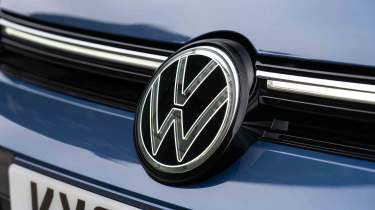
Volkswagen Golf alternatives
As mentioned above, the VW Golf faces competition not only from rival manufacturers, but also from the SEAT Leon and Skoda Octavia within its own stable. Other challengers include the Kia Ceed, Hyundai i30, Ford Focus, Honda Civic, Peugeot 308, and Vauxhall Astra, while for those looking towards the premium end of the market, there’s the Audi A3 Sportback (another car based upon the Golf platform), Mercedes A-Class and BMW 1 Series.
Anyone interested in a hybrid car but doesn’t fancy plugging in should consider either the excellent Honda Civic, or the frugal Toyota Corolla.
Deals on the Volkswagen Golf and alternatives
What do owners think?
Here’s what owners in the 2024 Driver Power survey thought of the VW Golf. These impressions are of the Mk8 car rather than the revised Mk8.5 version covered in this review.
| What they like | What they don’t like |
| “I can drive 680 miles in one day on a round trip to Devon, and I am not stiff or sore when I get back.” | “Disappointing quality. I expected better of VW and would not buy another Golf based on this one.” |
| “I love how comfortable and smooth a drive it is. It looks beautiful and the petrol costs are sensible.” | “The touchscreen is almost impossible to use safely while the car is in motion. It needs more switches.” |
| “A reasonably serene ride when I’m just going from A to B. It goes like the clappers when I’m in the mood.” | “I tend to use my phone because the Golf’s built-in navigation seems to take longer routes.” |
| “I find the much-maligned infotainment works really well if you set it up properly with shortcuts in the menu.” | “Luggage space is all right, but it can be a bit of a squeeze in the back seats if passengers have long legs.” |
| “The boot is very accommodating. There’s enough space is for a family to go on holiday. Even better, we can bring our dog along, too. | “I had two Golfs before my Mk8; each provided years of trouble-free motoring. This one is a joke in comparison.” |
| “My Golf offers a good balance between pin-sharp handling and limousine-like comfort. VW has struck just the right balance for me; it’s good to drive and comfortable.” | |
| “There’s a good amount of height and lumbar adjustment, and the bolsters give lots of support. The controls and switches are very user-friendly as they respond easily.” | |
| “The quality is good. I’ve driven many other cars, so I can appreciate the Golf’s fit and finish.” | |
| “It’s a great car in terms of style, performance, space and practicality, and the residuals will be strong.” |
Used and nearly new Volkswagen Golfs
The iconic Golf hatchback has offered a near-perfect blend of style, driving fun and practicality for over 50 years. You'll struggle to find a classier used buy, with the Golf Mk5 providing a much-needed return to form as a great driver's car in GTI trim, and later Golf Mk7 models offering improved on-board tech and a range of efficient engines. There is plenty of choice when it comes to power options, with an array of petrol, diesel and hybrid units available, although be sure to check the usual service history details, particularly on older-gen cars, as time is catching up and you may find bills more expensive.
Volkswagen Golf Mk7: 2013-2019
The Mk7 Volkswagen Golf brought together all of the German manufacturer's technical know-how in what is, arguably, the best overall package in the iconic hatch's history. Already undeniably classy and good to drive, the model received a Mk7.5 facelift in 2017, introducing styling tweaks and useful new onboard technology. Read our full Mk7 Volkswagen Golf buyer’s guide here…
Volkswagen Golf Mk6: 2009-2013
The Mk6 Golf is based on the same platform as its predecessor, although Volkswagen raised the interior quality over the Mk5 car. The cabin included plenty of soft-touch materials and comfortable seats, while it had a quiet, executive air out on the road. Prices remain strong, even after a number of years post-production, so you'll need to spend some time finding the best bang for your buck. Read our full Mk6 Volkswagen Golf buyer’s guide here…
Volkswagen Golf Mk5: 2003-2009
Keen drivers often speak about the Mk5 Golf GTI as being one of the best hot hatches Volkswagen produced. More mainstream models were also highly praised for their solid build quality, while strong engines and the extra practicality of the high-roofed Volkswagen Golf Plus and roomier estate models meant the Golf's appeal reached out to a variety of buyers. Read our full Mk5 Volkswagen Golf buyer’s guide here…
Older VW Golf models
Buyers on the hunt for fourth-generation or earlier examples of Volkswagen Golf will probably be best served by scouring specialists or even the classified ads.
VW launched the Mk1 Golf in 1974, followed by the slightly bigger Golf Mk2 nine years later. The Mk3 arrived in 1991, growing in size again, and was named European Car of the Year in 1992, while the Mk4 Golf went on to be the best-selling car in Europe. Older Golf models are still popular with enthusiasts, which means there are still decent, well-cared for examples to be found, but remember to still take extra care when looking to buy.
Volkswagen Golf pictures
Frequently Asked Questions
For some buyers there’s an element of buying a Golf because it’s a Golf. There’s nothing wrong with that, because it’s still a decent hatchback, but it doesn’t excel in any particular area these days.




